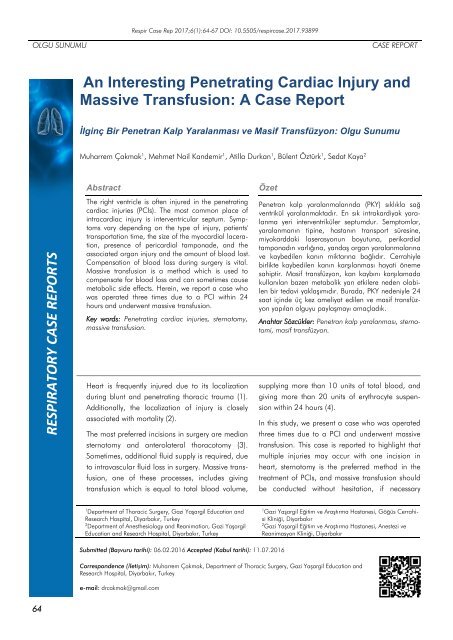Respircase Cilt: 6 - Sayı: 1 Yıl: 2017
You also want an ePaper? Increase the reach of your titles
YUMPU automatically turns print PDFs into web optimized ePapers that Google loves.
RESPIRATORY CASE REPORTS<br />
Respir Case Rep <strong>2017</strong>;6(1):64-67 DOI: 10.5505/respircase.<strong>2017</strong>.93899<br />
OLGU SUNUMU<br />
CASE REPORT<br />
An Interesting Penetrating Cardiac Injury and<br />
Massive Transfusion: A Case Report<br />
İlginç Bir Penetran Kalp Yaralanması ve Masif Transfüzyon: Olgu Sunumu<br />
Muharrem Çakmak 1 , Mehmet Nail Kandemir 1 , Atilla Durkan 1 , Bülent Öztürk 1 , Sedat Kaya 2<br />
Abstract<br />
The right ventricle is often injured in the penetrating<br />
cardiac injuries (PCIs). The most common place of<br />
intracardiac injury is interventricular septum. Symptoms<br />
vary depending on the type of injury, patients'<br />
transportation time, the size of the myocardial laceration,<br />
presence of pericardial tamponade, and the<br />
associated organ injury and the amount of blood lost.<br />
Compensation of blood loss during surgery is vital.<br />
Massive transfusion is a method which is used to<br />
compensate for blood loss and can sometimes cause<br />
metabolic side effects. Herein, we report a case who<br />
was operated three times due to a PCI within 24<br />
hours and underwent massive transfusion.<br />
Key words: Penetrating cardiac injuries, sternotomy,<br />
massive transfusion.<br />
Özet<br />
Penetran kalp yaralanmalarında (PKY) sıklıkla sağ<br />
ventrikül yaralanmaktadır. En sık intrakardiyak yaralanma<br />
yeri interventriküler septumdur. Semptomlar,<br />
yaralanmanın tipine, hastanın transport süresine,<br />
miyokarddaki laserasyonun boyutuna, perikardial<br />
tamponadın varlığına, yandaş organ yaralanmalarına<br />
ve kaybedilen kanın miktarına bağlıdır. Cerrahiyle<br />
birlikte kaybedilen kanın karşılanması hayati öneme<br />
sahiptir. Masif transfüzyon, kan kaybını karşılamada<br />
kullanılan bazen metabolik yan etkilere neden olabilen<br />
bir tedavi yaklaşımıdır. Burada, PKY nedeniyle 24<br />
saat içinde üç kez ameliyat edilen ve masif transfüzyon<br />
yapılan olguyu paylaşmayı amaçladık.<br />
Anahtar Sözcükler: Penetran kalp yaralanması, sternotomi,<br />
masif transfüzyon.<br />
Heart is frequently injured due to its localization<br />
during blunt and penetrating thoracic trauma (1).<br />
Additionally, the localization of injury is closely<br />
associated with mortality (2).<br />
The most preferred incisions in surgery are median<br />
sternotomy and anterolateral thoracotomy (3).<br />
Sometimes, additional fluid supply is required, due<br />
to intravascular fluid loss in surgery. Massive transfusion,<br />
one of these processes, includes giving<br />
transfusion which is equal to total blood volume,<br />
supplying more than 10 units of total blood, and<br />
giving more than 20 units of erythrocyte suspension<br />
within 24 hours (4).<br />
In this study, we present a case who was operated<br />
three times due to a PCI and underwent massive<br />
transfusion. This case is reported to highlight that<br />
multiple injuries may occur with one incision in<br />
heart, sternotomy is the preferred method in the<br />
treatment of PCIs, and massive transfusion should<br />
be conducted without hesitation, if necessary<br />
1 Department of Thoracic Surgery, Gazi Yaşargil Education and<br />
Research Hospital, Diyarbakır, Turkey<br />
2 Department of Anesthesiology and Reanimation, Gazi Yaşargil<br />
Education and Research Hospital, Diyarbakır, Turkey<br />
1 Gazi Yaşargil Eğitim ve Araştırma Hastanesi, Göğüs Cerrahisi<br />
Kliniği, Diyarbakır<br />
2 Gazi Yaşargil Eğitim ve Araştırma Hastanesi, Anestezi ve<br />
Reanimasyon Kliniği, Diyarbakır<br />
Submitted (Başvuru tarihi): 06.02.2016 Accepted (Kabul tarihi): 11.07.2016<br />
Correspondence (İletişim): Muharrem Çakmak, Department of Thoracic Surgery, Gazi Yaşargil Education and<br />
Research Hospital, Diyarbakır, Turkey<br />
e-mail: drcakmak@gmail.com<br />
64

















